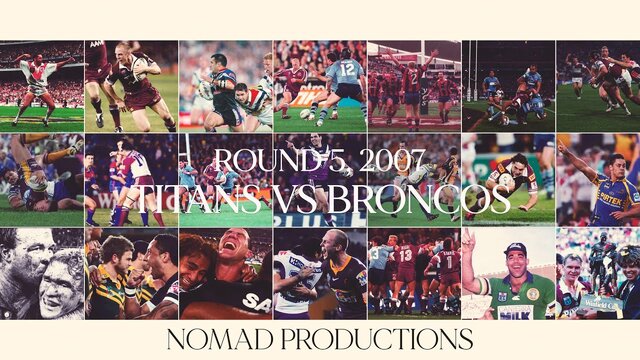I touched on it a bit in my earlier post but it would mean a perfect home and away schedule (22 GP) rather than the current farcical method. It would also allow SOO to be stand alone which is a huge issue in the game atm. And just imagine the calibre of a 12 team comp, there would be no Nikorimas, Takarangis or Linnetts running around and the standard of play would be unrivaled and would probably gain in popularity because of it. It would also allow the NRL to increase the salary cup (if TV rights remained strong) thus paying our stars more and preventing defections. The networks could compensate the loss of televising top grade matches by adding some extra ISC games to their schedule (whose calibre would also increase).
But of course, in order for this to happen, the culling or merging of Sydney sides would have to occur and as we know, RL fans are very tribal and many would walk away from the game. RL cannot afford to lose Sydney fans as they are still the life blood of the sport. NSW control the game and that will never change as the fan base here greatly out numbers any other location.
This is all pie in the sky stuff, I realize, but less is better when it comes to RL in Australia as it is so badly saturated with 16 teams already, yet others talk of expanding to 18 or 20 teams which is just ludicrous IMO. Any rebuttals?
Yeah, you smell.
Nah appreciate the response. I have a couple of points I'll address.
Firstly and probably the most important - money. How would RL as a sport maintain it's TV rights deal(s), which is largely the main thing that keeps the game afloat, with less teams and as a result, less games? If you take the approach of a 12 team comp, that means you only have 6 games a week. Compare this to other major sporting leagues around the world, and this is quite low, thus, exposure is lower. We have already seen in the past in previous TV rights negotiations that in order for bidders to pay more money for the rights, they need to get their cut in the way of advertising and so forth. How do you negate the loss of exposure and air time and therefore money, in order to keep the game afloat? Less teams mean less money, it's that simple. You can argue that the game wouldn't need as much from TV rights in order to keep it afloat, but in that same essence all you're doing is giving your main competitors the AFL, more opportunity to suck up the extra dollars on offer and thus, more money to continue to aggressively expand and promote their product. I don't need to explain how this isn't a good thing and would actively hurt RL as a sport and as a product. There's also the argument that expansion is good for the game because not only does it open new markets, it allows the game to actively promote itself as a
national game, because it has teams in most if not all corners of the country, not just the east coast as we do currently - the AFL, like them or loathe them, can actively do this and can back their words up by virtue of their spread of teams.
Secondly, less teams = less players. So there's a couple of issues at play on this one - firstly, less players means the likelihood of talented players slipping through the cracks is greater and the likelihood of them going to a rival code is higher - if you were a talented teen and there weren't alternatives in your current code of choice, your options are:
1) Continue playing in the hope one of the 12 teams somehow grabs you
2) Explore alternative codes, like AFL, RU
If young players are squeezed out of the game, junior participation levels will drop - it is a natural correlation, less opportunity = less desire to continue playing. Yes, there are shitloads of players that play for the love of the game from kid to teen to 30yo battle hardened man, but there are also players that play because they are naturally talented athletes who will excel in most codes given the opportunity to develop. Do you want to see a young Inglis playing AFL instead of RL, because that's what will happen if you drop the teams to 12, talented athletes will go elsewhere to fulfill their potential.
You're probably thinking, someone like a young Inglis would make any of 12 mooted sides. How though? If we assume all the talent in the game will be pidgeoned into 12 teams, then we assume those sides will be mostly stacked already. How would a young player usurp a star player if not given the opportunity? An example could be, Inglis broke through in 2004-2005, let's assume he broke through at Brisbane for arguments sake. Who's spot would he take? Hunt? Tate? Hodges? You could say, well what about Leon Bott, but if we're talking about 12 teams, Leon Bott doesn't exist, and thus, how does Inglis get a start? Do any of the aforementioned players deserve to be squeezed out of the game because they're bad players? Not imo, they were all great players and proved their worth over time, but when you have less spots and more competition, someone has to go in order to make room. Does Inglis wait 3 years to hope someone retires? Does he take his talents elsewhere?
This relates to the other issue I was thinking of re: less teams = less players. Turnover rate of players. There is already the argument at play in the NRL that teams lack experienced leaders because they are often cast aside for the next generation before their time is arguably up, it's a simple case of economics - who has the higher upside, the old guy who brings invaluable experience and leadership but only has 12-24 months left in the game, or the young guy who can run like the wind but has no professionalism because he's been awesome since day dot? That's cap and man management sure, but if it's already happening now with 16 teams, it would only get worse with 12 teams.
There is more than enough talent to support 18 teams. It also gives more youngsters opportunities that they may not have been presented previously because teams couldn't find a spot for them. Cody Walker could've been playing at 21 instead of debuting at 26. There's definitely the argument that he hit the ground running at 26 because he had to spend time in Q Cup, but the NRL is state league on steroids.
Also a minor point, but reducing the number of teams makes no impact on housing prices, the price of beer or food at a game, any other reason cited for people not attending games. Conversely, reducing the number of teams
does reduces the number of fans, by virtue of them no longer having anyone to support.
There was something else I was going to post but I forgot. Over to you (or not, this doesn't have to be a back and forth essay v essay discussion).

